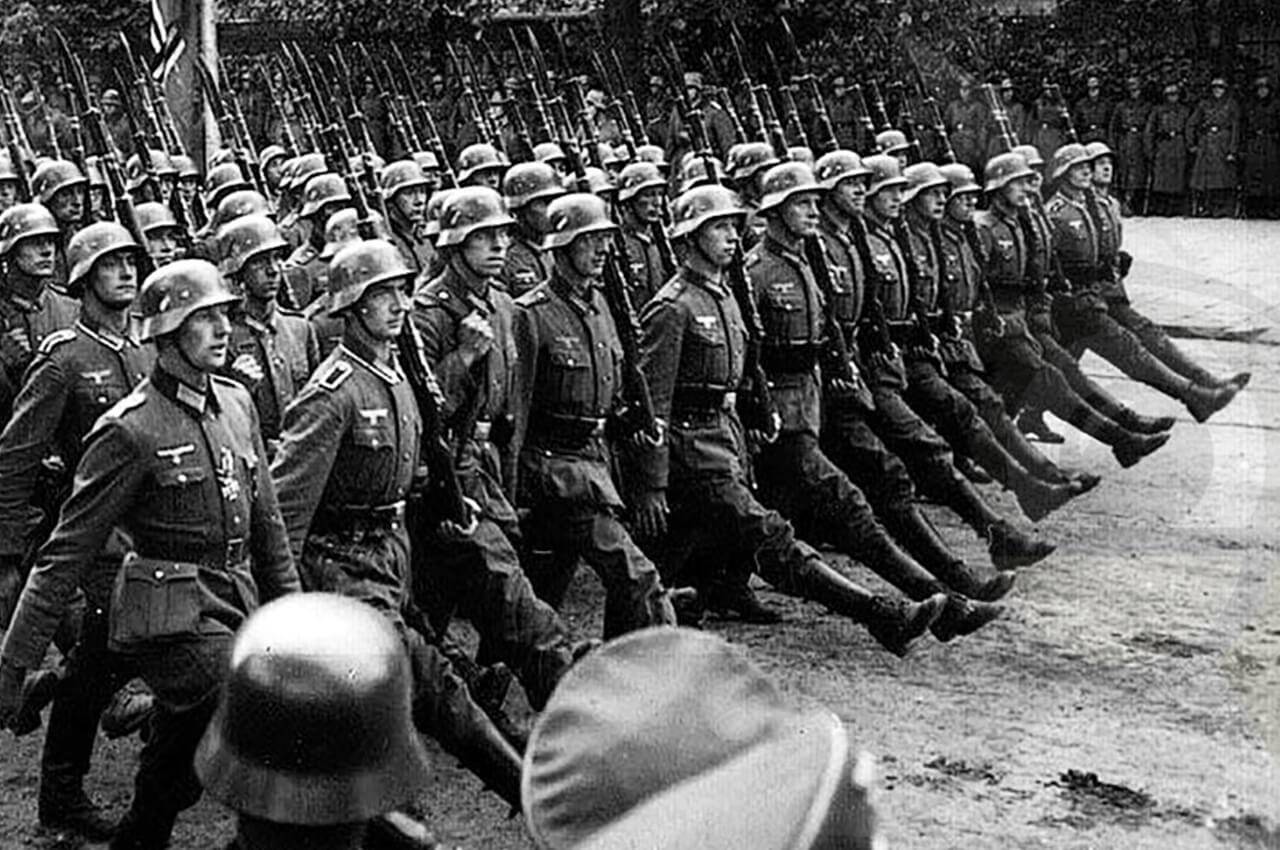1 SEP 1939: World War II and Germany invades Poland. The German invasion of Poland led to the declaration of war against Germany by the United Kingdom and France and began the Second World War.
At 4.45 am on 1 September 1939 the German battleship Schleswig-Holstein opened fire on the Polish garrison of the Westerplatte Fort, Danzig (modern-day Gdansk), in what was to become the first military engagement of World War Two. Simultaneously, 62 German divisions supported by 1,300 aircraft commenced the invasion of Poland.
The decision of Adolf Hitler to invade Poland was a gamble. The Wehrmacht (the German Army) was not yet at full strength and the German economy was still locked into peacetime production. As such, the invasion alarmed Hitler’s generals and raised opposition to his command – and leaks of his war plans to Britain and France.
Hitler’s generals urged caution and asked for more time to complete the defences of the ‘West Wall’, in order to stem any British and French counter-offensive in the west while the bulk of the Wehrmacht was engaged in the east. Their leader dismissed their concerns, however, and demanded instead their total loyalty.
Hitler was confident that the invasion of Poland would result in a short, victorious war for two important reasons.
First, he was convinced that the deployment of the world’s first armoured corps would swiftly defeat the Polish armed forces in a blitzkrieg offensive.
Secondly, he judged the British and French prime-ministers, Neville Chamberlain and Edouard Daladier, to be weak, indecisive leaders who would opt for a peace settlement rather than war.
Hitler’s only real concern was that a sudden German invasion of Poland might alarm Stalin and trigger a war with the Soviet Union. Stalin feared a German invasion and had been seeking an anti-Nazi ‘collective security’ alliance with the western powers for many years, but by July 1939 Britain and France had still not agreed terms.
Poland had also rejected an alliance with the Soviet Union, and refused permission for the Red Army to cross its territory to engage the Wehrmacht in a future war. Hitler saw his opportunity, and authorised his Foreign Minister, Joachim von Ribbentrop to enter into secret negotiations with the Soviet Union.
The result was the signing of the Nazi-Soviet Pact on 23 August 1939. Both Hitler and Stalin set aside their mutual antipathy for national gain and in particular the restoration of their pre-1919 borders.
An ecstatic Hitler brought the date of the invasion forward to 26 August to take advantage of the surprise the pact had provoked in the west. However, only hours before the attack Hitler cancelled the invasion when his ally Mussolini declared that Italy was not ready to go to war, and Britain declared a formal military alliance with Poland.
Once reassured of Mussolini’s political support, Hitler reset the invasion for 1 September 1939. The invasion was not dependent on Italian military support and Hitler dismissed the Anglo-Polish treaty as an empty gesture.
At 6 am on 1 September Warsaw was struck by the first of a succession of bombing raids, while two major German army groups invaded Poland from Prussia in the north and Slovakia in the south. Air supremacy was achieved on the first day, after most of Poland’s airforce was caught on the ground. Panzer spearheads smashed holes in the Polish lines and permitted the slower moving German infantry to pour through into the Polish rear.
In advance of the line of attack the Luftwaffe heavily bombed all road and rail junctions, and concentrations of Polish troops. Towns and villages were deliberately bombed to create a fleeing mass of terror-stricken civilians to block the roads and hamper the flow of reinforcements to the front.
Flying directly ahead of the Panzers, the Junkers Ju-87 dive-bomber (Stuka) fulfilled the role of artillery, and destroyed any strong points in the German path.
The surprise German strategy of blitzkreig was based upon continuous advance and the prevention of a static frontline that would permit Polish forces time to regroup.
At 8am, on 1 September, Poland requested immediate military assistance from France and Britain, but it was not until noon on 3 September that Britain declared war on Germany, followed by France’s declaration at 5.00pm.
The delay reflected British hopes that Hitler would respond to demands and end the invasion.
Western military commanders were rooted in the strategies of World War One and entirely unprepared for the rapid invasion of Poland. They expected the Germans to probe and bombard the Polish line with heavy artillery for several weeks before launching a full invasion.
Consequently while the Panzers advanced, French troops confined themselves to scouting and mapping the German ‘West Wall’, while awaiting the deployment of the British Expeditionary Force (BEF) and full mobilisation.
There was no offensive strategy, because France expected to fight a war of defence, and had invested heavily in the static defences of the Maginot line. The RAF also dropped not bombs but leaflets, urging a peace settlement. Photo: German troops parade through Warsaw, Poland. More; http://ow.ly/RC94R



